Sparkling under steel toes
October 22nd, 2025
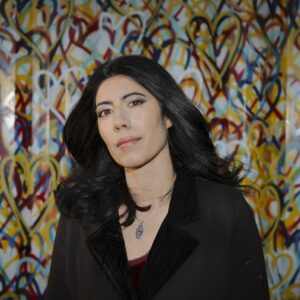
Poetry virtually never pays the bills, but it can reflect the world in which poets work. Such is the case with Christina Shah of New Westminster who spends most of her time on the road, working in industrial sales for an industrial distributor. She makes her way in this male-dominated workplace and writes about what she finds there. In if: prey, then: huntress: poems (Nightwood $19.95), journeyed carpenter and fellow poet, Kate Braid says: “Here’s a woman, ‘a huntress / sparkling under steel toes’ who’s not afraid to say it as she sees it, whether that be in a fine restaurant or on a heavy industrial site, admiring gel nails or a jerrycan.” The following interview was recently conducted with Shah by BC BookWorld staff.
*
BC BookWorld: How did you get into heavy industry work?
Christina Shah: How much time do you have? Someone once told me about industrial sales, and said “if you want a man’s pay, you’ve got to do a man’s work.” I put two-and-two together. Sales is a common off-ramp from the bar and restaurant industry, which is where my work poetry started. I began working for one of the industrial laundries, where I had a mix of restaurant and industrial accounts, so I saw that as my entrée into this world. I like being on the road—meeting people, seeing places, learning how things work and helping solve complex problems. I work with a lot of great people (customers, coworkers and suppliers) and I like the pay cheque and commissions.
BCBW: When did you start writing?
CH: I tried writing before I could write. As a four-year old, this involved writing a letter to a girl named Laura who lived on the same street. I wanted a friend to play with. All I could find in the moment were some seed packets and a yellow highlighter in the garage, so I highlighted all the words on the back. Her mom (who’d originally put me up to it) told me that was not good enough. Apparently not owning a play oven and baking set also disqualified me. I suppose this early rejection (and willingness to improvise) prepared me for both my writing and sales careers. I wrote short fiction starting at age ten and into my twenties, but poetry has always been my mainstay, starting at age seven.
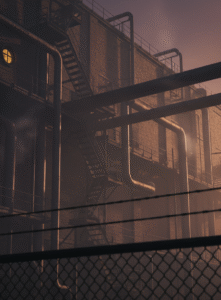
BCBW: Describe merging your passions for writing and industrial work. How do these two influences effect your poetic imagery, and did this happen quickly or was it a slow revelation?
CH: It happened quite slowly, over the course of many years. A term I like to use is “woolgathering.” I see so many things and have many interesting conversations while on the road. I love the contrast of poetic language or sensory descriptions with some of these very utilitarian and spare environments (and even technical terms). I was influenced by the work of the Vancouver Industrial Writers’ Union, and received a lot of encouragement from its founders, Calvin Wharton (my former Creative Writing instructor), Kate Braid and Tom Wayman.
BCBW: There’s a sense of past times, of long ago, in some of your poems (Britannia Mine, rig veda, noble gas town, for example). What attracts you to this history link?
CH: I’m a collector of other people’s stories in addition to my own. I’m fascinated by boom-and-bust stories. There’s also been this insistence in Vancouver of wanting to forget our roots as a forestry and mining town (the “world-class city” refrain). Granted, the world has changed since the bad old days, and as this city has grown, it has necessarily diversified. That said, there was also a lot of colour back then that makes for interesting material.
BCBW: In the middle of if: prey, then: huntress, there are a series of “food” poems. What was your inspiration for this?
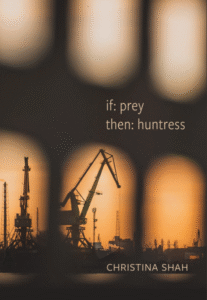
CH: I love to bake and eat, and food is one of the best ways to connect with people of all walks of life, whether through homemade gifts, or through a shared dining experience (in both personal and professional contexts). Also, when I’m out on the road, I’m foraging/fishing for food (my commissions). Plus, I’m an avid mushroom forager. A recent ethnographic study published interesting results stemming from some archeological evidence from the Holocene era that questions the notion of traditional gendered divisions of labour (e.g. men being hunters, and women being gatherers). Apparently back in the bad old days, women were skilled big game hunters as well!
BCBW: You visit many subjects in this collection, not just work. How do you choose a subject to focus upon when you begin a poem?
CH: Work is my main squeeze, but I love object poetry, or random urban scenes as well. Those three subjects offer some kind of loose parameters in my mind—gesture drawings that can meet the blank page.
BCBW: In your process of writing, what motivates your writing? How does a poem start?
CH: I’m often motivated by a scene that involves some kind of contrast, whether it’s scenic or emotional. Today it was crimson foliage cascading down some berms on either side of Highway 1 as I headed into the Cassiar Tunnel. It starts with some kind of imagistic and sound collision in my brain, some kind of “quantum leap.”
BCBW: You work with a poetry-writing group called “The Harbour Centre Five.” Please describe how interactions with other writers in such an organized way helps your writing practice.
CH: It has been invaluable to work with my poetry collective. We formed upon graduating from Fiona Tinwei Lam and Evelyn Lau’s Poetry for the Weekend Student class at SFU Harbour Centre. The other members include Jaeyun Yoo, James X. Wang, Robbie Chesick, and Rebecca Holand. HC5 (and our instructors) have been incredibly supportive, and we’ve all grown together. We keep one another on track with deadlines and regular workshopping, but also with encouragement and perspective, having worked together for six years. One-on-one sharing (or simply conversations about the writing life) with other writers has been immensely useful, as well as comforting.
BCBW: You have also worked with videographer Mark Mushet. Will you be doing more video poems and why?
CH: Mark did a great job with “rig veda.” I’m currently working on another collaboration. Videopoetry is a wonderful medium with a broad reach and an interesting history. It’s also very special to be able to work with a translator. I had the pleasure of working with local poet Daniela Rodriguez, who did a marvelous job of translating rig veda into Spanish.
BCBW: Anything else you want to add?
CH: To me, it’s worthwhile to write about working people and our environments. Most of us spend the majority of our time at work and poetry that reflects this reality can offer us so much in our day-to-day lives: comfort, humour, connection and a sense of wonder—even in the most ordinary moments and places.
9780889715028
An edited version of this interview will be printed in the Winter issue of BC BookWorld newspaper, due out the end of November, 2025.
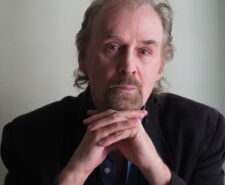
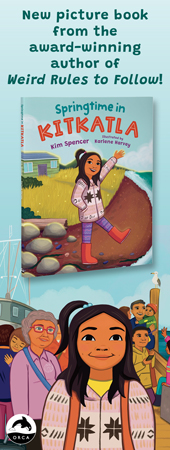
Leave a Reply